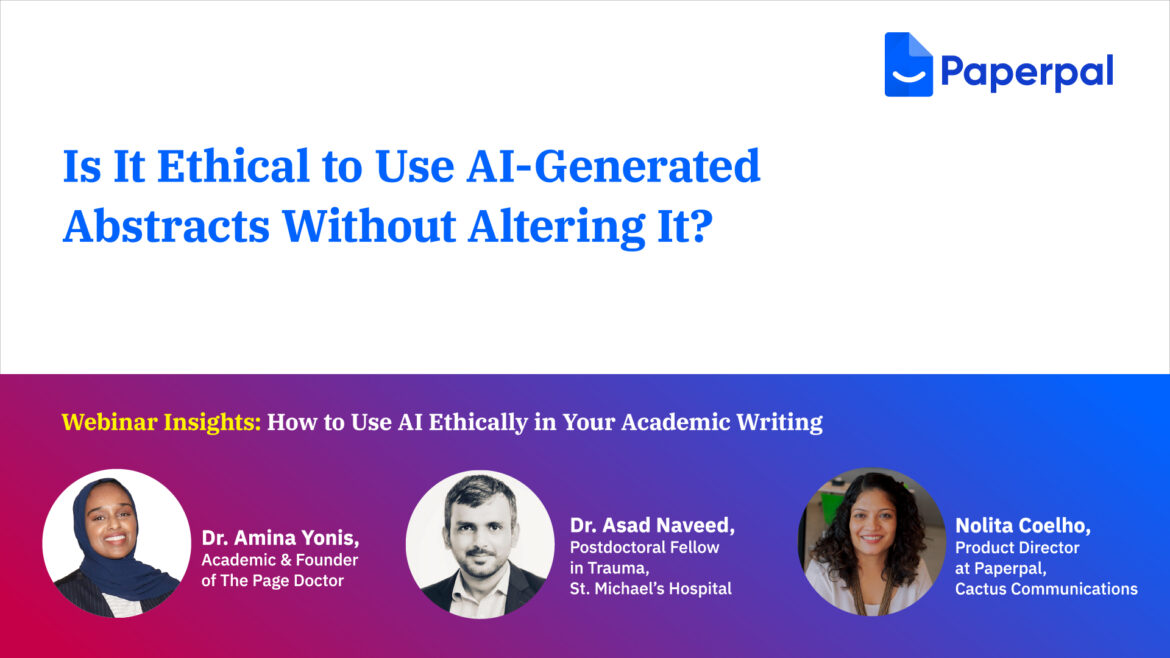The use of AI tools in academic content creation has sparked a debate on the ethical implications of using AI-generated abstracts without any modifications. While some argue that reproducing the abstract generated by an AI tool without any modifications may not necessarily be unethical, others raise concerns about the originality and integrity of the work, especially if it’s presented without any critical input from the author. This blog highlights the need for clear ethical guidelines regarding the use of AI tools in academic writing and underscores the ongoing discussions on the ethical implications of using AI tools in academic content creation.
AI-Owned Content vs. AI-Enhanced Content
Using AI to generate abstracts or emails based on one’s manuscript and copying them without alteration is not considered unethical. The reason is that the abstracts generated by AI tools are summaries derived from the author’s original text. Here, AI functions as a tool for summarizing or augmenting the author’s original work rather than incorporating ideas from external sources. Since the content is derived from the author’s text, the act of generating the abstract is perceived as both legal and ethical. This ensures that the integrity of the author’s original work is preserved and that the use of AI tools aligns with ethical standards in academic writing.
How does AI content enhancement work?
AI-generated abstracts stem from the author’s instructions and content, preserving the originality of the work. When authors use AI tools to create abstracts, they provide specific instructions to the tool based on their own manuscript. The AI then generates a summary based on these instructions, essentially condensing the author’s original ideas into a more concise format. Thus, the resulting abstracts remain authentic expressions of the author’s work.
Watch Experts Speak on the Ethics of Using AI-Generated Content
Should you disclose AI usage for content enhancement?
It’s essential to adhere to journal guidelines and ensure transparency when using AI-generated abstracts in submissions. Some journals may require authors to disclose their use of AI tools in the research process to maintain transparency and uphold academic integrity. By disclosing the use of AI tools, authors demonstrate their commitment to following ethical practices and complying with journal guidelines. Authors should familiarize themselves with journal guidelines regarding AI use and ensure compliance to avoid potential issues during the submission process. While not all journals may explicitly require disclosure of AI tool usage, maintaining transparency aligns with best practices in academic publishing and fosters trust within the scholarly community.
Researchers and PhD students have a responsibility to supervise AI-generated abstracts to ensure it meets academic standards. This includes carefully reviewing and validating the output generated by AI tools to verify its accuracy, relevance, and adherence to scholarly conventions.
Also, there’s a distinction between using AI for academic work, where careful consideration and proper attribution are crucial, and other forms of communication like emails. While AI-generated emails may be suitable for streamlining communication tasks, academic work demands a higher level of critical observation and originality.
The ethical use of AI-generated abstracts in academic writing necessitates a commitment to originality, supervision, and adherence to journal guidelines. As AI continues to play a role in scholarly publications, researchers and PhD students are encouraged to use these tools responsibly and stay informed about the evolving ethical landscape in academic publishing.
Paperpal is a comprehensive AI writing toolkit that helps students and researchers achieve 2x the writing in half the time. It leverages 21+ years of STM experience and insights from millions of research articles to provide in-depth academic writing, language editing, and submission readiness support to help you write better, faster.
Get accurate academic translations, rewriting support, grammar checks, vocabulary suggestions, and generative AI assistance that delivers human precision at machine speed. Try for free or upgrade to Paperpal Prime starting at US$19 a month to access premium features, including consistency, plagiarism, and 30+ submission readiness checks to help you succeed.
Experience the future of academic writing – Sign up to Paperpal and start writing for free!



